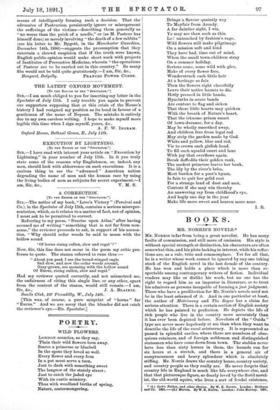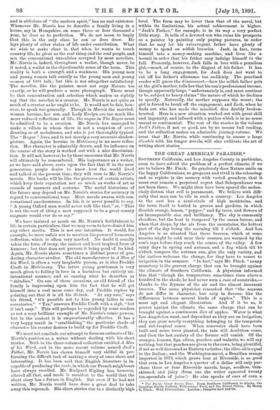BOOKS.
MR. NORRIS'S NOVELS.*
MR. NORRIS is far from being a great novelist. He has many faults of commission, and still more of omission. His style is without special strength or distinction, his characters are often somewhat thin, and his plots lacking in interest, while his reflec- tions are, as a rule, trite and commonplace. Yet for all that, he is a writer whose work cannot be ignored by any one taking stock of the English novel in the last decade of the century. He has won and holds a place which is more than re- spectable among contemporary writers of fiction. Individual readers may like or dislike his work, but no one has the right to regard him as an impostor in literature, or to treat his admirers as persons incapable of forming a just judgment. Those who have a predilection for Mr. Norris's novels need not be in the least ashamed of it. And in one particular at least, the author of Matrimony and The Rogue has a claim for serious attention. There is a certain section of English society which he has painted to perfection. He depicts the life of rich people who live in the country more accurately than it has ever been depicted before. Novelists of the " Oujda" type are never more hopelessly at sea than when they want to describe the life of the rural aristocracy. It is represented as passed in splendid castles, where there are numbers of obse- quious retainers, and of foreign noblemen and distinguished statesmen who have come down from town. The stables never have less than sixty horses in them, the hounds run for six hours at a stretch, and there is a general air of sumptuousness and heavy splendour which is absolutely stifling. Mr. Norris draws the country house, country society, and country people as they really are. He never forgets that country life in England is much like life everywhere else, and that that picturesque figure, so dearly loved by the florid novel- ist, the old-world squire, who lives a sort of feudal existence, • (1.) Jack's Father, and other Stories. By W. E. Norris. London: Methuen sad Co. 198L—(2.) Marcia. By W. E. Norris. London : John Murray. NH.
and is oblivious of " the modern spirit," has no real existence. Whenever Mr. Norris has to describe a family living in a house, say in Hampshire, on some three or four thousand a year, he does so to perfection. We do not mean to imply that this is the only class he can or does draw. He lays plenty of other states of life under contribution. What we wish to make clear is, that when he wants to touch country life, he gives us the real thing and the real people, and not the conventional unrealities accepted by most novelists. Mr. Norris is, indeed, throughout a realist, though never, be it noted, a realist in the objectionable sense of the term. This reality is both a strength and a weakness. His young men and young women talk exactly as the young men and young women of 1891 talk ; but this is not altogether satisfactory. The novelist, like the painter, must not copy Nature too exactly, or he will produce a mere photograph. There must be that concentration and selection which makes us rightly say that the novelist is a creator. Mr. Norris is not quite as much of a creator as he ought to be. It would not be fair, how- ever, to speak too generally. Though in Marcia the married- woman heroine, her son, and Lady Evelyn are too much like mere reduced reflections of life, the rogue in The Bogue must be admitted to be a creation. Mr. Norris has managed to make a villain in whom there is not a suspicion of over- drawing or of melodrama, and who is yet thoroughly typical. The " Rogue " lives, and is not merely a very accurate shadow- picture. Again, the heroine in Matrimony is no mere reflec- tion. Her character is admirably drawn, and its influence on the course of the story is worked out with a nice discrimina- tion. It will not, however, be by these successes that Mr. Norris will ultimately be remembered. His importance as a writer, as we have said above, rests upon the fact that if in the next generation, people desire to know how the world lived and talked at the present time, they will turn to Mr. Norris's novels. His books will be like the pictures of certain artists, which keep their reputation not so much as works of art as records of manners and costume. The social historians of the future may depend on Mr. Norris's stories for accuracy in regard to conversational tone. Most novels swarm with con- versational anachronisms. In his, it is never possible to say, A young Oxford man would never talk like that," or, " That is not the sort of thing a man supposed to be a great county magnate would ever do or say."
We have insisted so much on Mr. Norris's faithfulness to life in certain particulars, that we may seem to have denied him any other merits. This is not our intention. It would, for -example, be most unfair not to mention his power of humorous reflection, which is often very marked. No doubt it usually takes the form of irony, the easiest and least inspired form of humour ; but that does not prevent it being good of its kind. Again, Mr. Norris shows sometimes a distinct power of pro- ducing character-studies. The old manufacturer in A Man of his Word, is often a very laughable person, as is also Freddie Croft in Matrimony. The latter young gentleman is very much given to falling in love in a harmless but entirely un- intentional manner, and so causing what he describes as " shindies." On one of these occasions, an old friend of the family is impressing upon him the fact that he will get himself into a real mess some day, and Freddie replies by pointing out that it is all his "At any rate," says his friend, "it's possible not to kiss young ladies in con- servatories." " Yes," answers Freddie Croft with a sigh, " but it isn't easy." This will perhaps be regarded by some readers as not a very brilliant example of Mr. Norris's comic powers, but in the context it is unquestionably effective. It has a very happy result in " establishing " the particular shade of character his creator desires to build up for Freddie Croft.
We must not conclude our attempt to form an estimate of Mr. Norris's position as a writer without dealing with his short stories. Both in the three-volumed collection entitled A Man of his Word, and in the more recent volume named Jack's Father, Mr. Norris has shown himself very skilful in per- forming the difficult task of making a story at once short and interesting. It has been said that English literature is in- capable of producing the conte, in which our French neighbours have always excelled. Mr. Rudyard Kipling has, however, altered all that, and made it manifest to the world that the short story has a future in English. But even if he had not written, Mr. Norris would have done a great deal to take away this reproach. His short stories rise to a distinctly high level. The form may be lower than that of the novel, but within its limitations, his actual achievement is higher. " Jack's Father," for example, is in its way a very perfect little story. It tells of a devoted son who ruins his prospects as a painter by painting only paying pictures, in order that he may let his extravagant father have plenty of money to spend on selfish luxuries. Jack, in fact, turns himself into a money-making machine, and lives like a hermit in order that his father may indulge himself to the full. Presently, however, Jack falls in love with a penniless girl,—much, of course, to the disgust of his father. It has to be a long engagement, for Jack does not want to cut off his father's allowance too suddenly. The practised reader will guess the denouement—how the selfish father gets at the girl's mother, tells her that his son's professional income, though apparently large, " unfortunately is, and must continue to be, subject to heavy claims" the nature of which he declines to specify. Naturally, the mother supposes the worst; the girl is forced to break off the engagement, and Jack, when he finds out who has made the mischief, dies doubly broken- hearted. Here is a new situation worked out with great skill and ingenuity, and infused with a pathos which is in no sense unreal or sentimental. The rest of the stories in the volume Jack's Father, if not so good, are by no means bad reading, and the collection makes an admirable journey-volume. We trust that Mr. Norris, while continuing to amuse a large clientele with his longer novels, will also cultivate the art of writing short stories.



















































 Previous page
Previous page